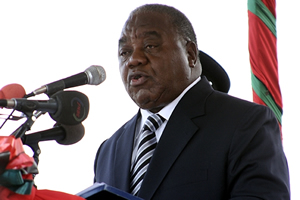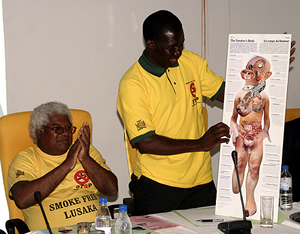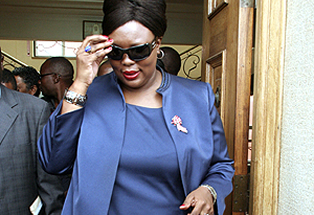 President Rupiah Banda says there is need to respond to the global economic crisis in a manner that does not just mitigate its effects but positions the country to move forward and sustain its economic gains.
President Rupiah Banda says there is need to respond to the global economic crisis in a manner that does not just mitigate its effects but positions the country to move forward and sustain its economic gains.
Mr. Banda said in light of the global crunch, there was need to take measures that would strengthen the competitiveness, infrastructure, food security and the resolve of the country to prosper.
He said the effects of the crisis were real as manifested by the closure of some operations and job losses in the mining sector.
Mr. Banda said the country’s response to the global financial crisis had to ensure that there was an adequate safety net to protect the vulnerable in society in a bid to moderate their suffering due to job losses.
The President said a reduction in government’s revenue collection was a wake up call not only to implement resolutions made in many fora such as previous indabas and the north–south corridor meetings, but to diversify the economy away from dependence on copper.
Mr. Banda was speaking in Livingstone today at the opening of the sixth Zambia International Business Advisory Council (ZIBAC )conference held at Zambezi Sun Hotel under the theme, “Global Economic Crisis: Zambia’s Response to growth and competitiveness.”
He said there was urgent need to maintain food security by prioritizing measures to support the continued growth of the agricultural industry.
Mr. Banda also called for the creation of a conducive business and investment climate by way of producing quality goods and services if the country was to compete favorably in the global economy.
He also stressed the need to implement and effectively monitor reforms under the private sector development program.
To that effect Mr. Banda said government had put in place a framework for monitoring the implementation of all agreed policies, programs and projects on a monthly basis to ensure bottlenecks in the implementation process were easily identified.
He assured the private sector and co-operating partners that government would continue attaching strong political will and commitment to private sector development.
Mr. Banda said government would continue to appreciate all the support from its cooperating partners in order to implement phase two of the private sector development program.
And speaking on behalf of Zambia’s cooperating partners at the same function, Dutch Ambassador to Zambia, Harry Molenaar said their primary purpose was to reduce poverty.
Mr. Molenaar said Zambia had scarce resources and needed to double its efforts to attract foreign investment.
He urged government to promote local investment by enhancing operations of the Small and Medium Enterprises (SMEs)
Mr. Molenaar said the country’s cooperating partners would strive to promote business competitiveness and a vibrant private sector through continued support of private sector development programs.
And moving a vote of thanks, Zambia Business Forum Chief Executive Officer Reginald Mfula said concerted efforts from all economic players in the country were needed to minimize the impact of the global crunch.
Mr. Mfula said implementation of solutions already identified and those yet to be agreed upon between government and the private sector would result in poverty reduction, job creation, more domestic and foreign investment and food security among others.
He said implementation of programs in a timely manner was a key factor in attaining sustainable economic development.
Mr. Mfula said there was need by the civil service as implementers of government policies to move beyond appreciating policy change by understanding the importance and urgency of the challenges the country is currently facing.
ZANIS



